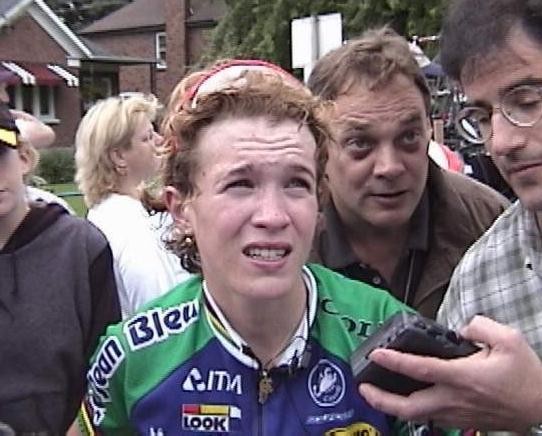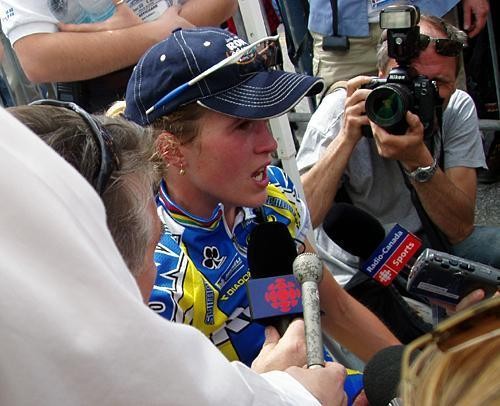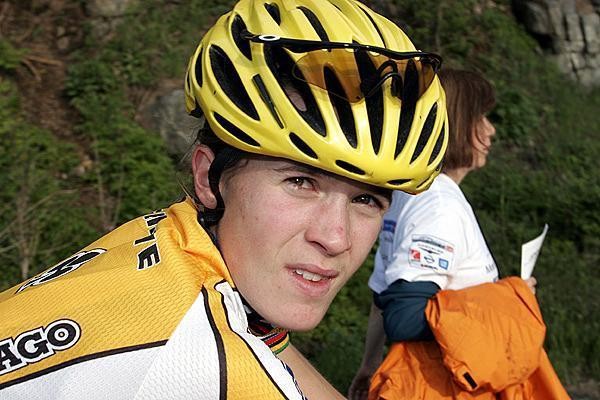No turning back for Jeanson
One of North America's most dominant and exciting riders of all time was, like Floyd Landis, at the...



An interview with Geneviève Jeanson, Wednesday, December 20, 2006
One of North America's most dominant and exciting riders of all time was, like Floyd Landis, at the height of her career when doping charges brought her world crashing down around her. Unlike Landis, Jeanson, facing a lifetime ban from the sport, immediately withdrew from the spotlight after asserting her innocence. When the US anti-doping association (USADA) announced a settlement that handed the Canadian a two-year sentence, Jeanson was thrust back into the spotlight - her fans hoping she would make a comeback, her detractors rallying against that possibility. Cyclingnews' Matt Hansen was fortunate to be granted an exclusive interview with the reclusive Québécois, and learned first hand what her future plans hold.
For 25-year-old cyclist Geneviève Jeanson, a year has been a lifetime.
One of Canada's most prolific athletes in recent years, the young Olympian disappeared completely from the scene last year after receiving a life suspension for evidence of performance-enhancing drugs in competition. Jeanson won two World Championships, several World Cups and a host of top international results, but her short career was often shrouded in controversy.
The saga continued just over two weeks ago when the Lachine, Quebec athlete re-appeared in the news, having agreed to a settlement with the United States Anti-Doping Agency (USADA) that could see her racing in 2007. Many in the cycling community wondered why the athlete would agree to such a settlement, after insisting she was innocent.
Jeanson has maintained her innocence over the positive drug test in 2005, claiming the result and test itself were flawed. After her controversial career was stopped short by the suspension, one of Canada's best hopes for Olympic gold in the next few years came to a grinding halt as well. Now, after a difficult two years, she will be permitted to race as early as next summer, and this turn of events could become one of the best things that ever happened to her. In a rare interview, the reclusive cyclist admitted that she has, in fact, never been happier.
"I've changed so much this past year that I have a hard time imagining who I was before," Jeanson admitted. At first glance, the changes are quite evident. I met Ms. Jeanson at the trendy Viceroy Hotel in Santa Monica, California while she was on a weekend shopping foray in Los Angeles. Amid celebrities and Hollywood socialites, Jeanson fit in perfectly, wearing designer jeans, Italian boots and a fresh-out-the-salon spiked hairstyle. The cyclist looked nothing like the girl from 2005, clad in sweat pants and team t-shirt. Most importantly, during the interview, the cyclist was no longer the stern, stressed and serious athlete that most of the public had seen in her many press conferences.
Get The Leadout Newsletter
The latest race content, interviews, features, reviews and expert buying guides, direct to your inbox!
Beaming as she sipped a martini, Jeanson spoke of what she had been up to this past year, something that the media had been speculating on since her abrupt retirement. "I've been making the transition from athlete to normal person," Jeanson said. "When you are an athlete, you have your own world. Everything is pampered for you, you don't work, you don't interact with other people. It's a very closed world - you train, eat and sleep."
Much of Jeanson's time has been spent at a restaurant she purchased last year in Phoenix, Arizona. She co-owns the establishment, and works there almost every day, opening in the wee hours of the morning for patrons to get their first cup of coffee. In fact, it's taken so much of her time she's had very little interaction with her former world of cycling.
"The same way I wanted to be first at the top of Mont Royal every year [at the annual Montreal World Cup, a race she won four times] is what has motivated me to run the best damn restaurant," she explains. "So I surround myself with successful restaurant owners, to learn from them. I am constantly speaking and interacting with business people so I can apply all the knowledge to making my place the best. It's not something I will do for the rest of my life, but for now, it's truly my passion."
Jeanson has, in fact, separated herself so much from the world of cycling she feels very much out of the loop with her former sport. "I didn't even know who won the World Championships this year for several weeks after, until my father told me," she said. Case in point, Jeanson hadn't even heard about the scathing letter denouncing the USADA decision, written by her former Canadian National team-mate Anne Samplonius, published in many of the major newspapers and cycling websites.
Jeanson's name has been associated with cycling in the media for both the right and the wrong reasons. She tested positive for the banned blood booster Erythopoetin (EPO) in the USA at the Tour de 'Toona last July. Since she had missed a post-race drug test in Belgium in 2004, which also constituted a drug offence, the second offense resulted in a lifetime ban.
Jeanson, however, vigorously denied the test, and ultimately produced evidence to challenge the validity of the test based on findings by the Belgian professor, Joris Delanghe. Delanghe conducted several studies that concluded her positive test could be the result of exercise induced proteinura, not EPO use.
So why now, then, would she agree to settling with the USADA which would allow her to race again? Why not fight it if she truly does believe her innocence?
"I had to accept the deal," Jeanson said. "My lawyer is Canadian, I would have to change lawyers and I simply couldn't afford the long, drawn-out appeal. Look at the Tour de France winner, Floyd Landis, they say it may cost him his whole fortune to fight his drug charges. So this way was the easiest to put this chapter of my life behind me."
But don't look for a comeback any time soon. With her young age, the cyclist could possibly race in the next two Olympics and possibly, snag a medal for Canada. But her recent decision to settle with USADA was not made to allow her to be a pro cyclist again.
"I won't race ever again. When I was winning, it was lonely at the top. I was never happy," she said. "I had to completely remove myself from distractions, no friends, no life. It was the only way to dedicate oneself to the sport, and I can't do that again. I don't regret my approach; it's the way of a champion. But for me to race again, I would have to become that same person. That person is not the same person as I am now."
Jeanson is also quick to point out she was never truly satisfied, even with all her victories. "Inside, I was hating my life. I was hating the person I had to be," She said. "Unsocial, very serious, a one track mind. Now I enjoy my time, I go out with new people, have a glass of wine or two. Now, I can be the person I always wanted to be, the real me."
As part of making the transition from athlete to business owner and "normal" person, Jeanson has had to learn quickly the ways of independence. She has recently bought her own house, moving out of the home she shared with long-time coach, Andre Aubut.
Aubut was constantly at the centre of controversy with Jeanson, with his temper and unorthodox training methods putting the athlete at odds with the Canadian and Quebec Cycling Federations. As far as the treatment she received from the cycling federations, Jeanson is equally philosophical. Because of disagreements with the Quebec cycling federation, Jeanson actually raced the past few seasons with an American racing license, hence her settlement with the USADA, not the Canadian federation.
"When I was winning, the Quebec people were very proud and supportive of me: I was theirs, they felt special," she said. "But the Quebec cycling federation was always frustrated and jealous I was not part of their club, their clique, their mafia. I did things my own way, and it worked."
Through all of her success and her failures, Jeanson holds no regrets. "Everything, all my decisions, my methods, my lifestyle, they were my choices." said Jeanson, "I wouldn't change a thing, my coach, nothing. Sportswise, Aubut is good at what he does, it's just time for me to move on with my life."
Jeanson continued, "And all the media, all the crap that was written, it never got to me. I have good friends and family that supported me. They were the ones I was more worried about, because inside I knew I did nothing wrong. I knew I didn't deserve all that bullshit, but I was more concerned with the Jeanson name being trashed in the newspapers. I was ashamed for my parents and family, but not for me. I knew it was all lies."
At 25, the former athlete has her whole life ahead of her, which falls into her belief that things really do happen for a reason. "I'm very happy to be making this transition at 25, not 35, or 45. I'm still very active. I don't ride anymore, but I run and do other sports. But this time, work comes first, followed by exercise," Jeanson says. "Being an athlete, that part of my life is done."